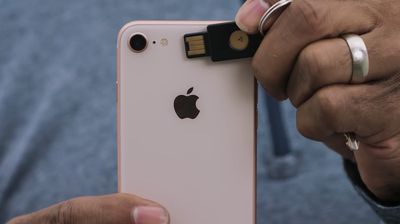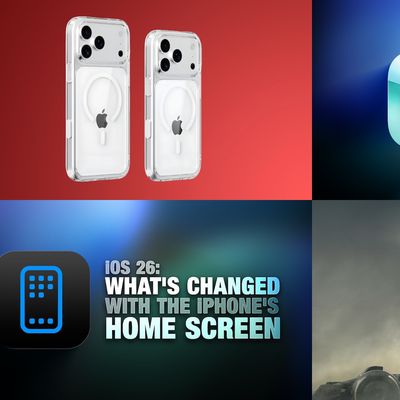Yubico is a company that sells the "YubiKey," a small piece of hardware that protects access to computers and online accounts by providing strong two-factor authentication in lieu of receiving a text message code on a smartphone or other 2FA steps. With the NFC-equipped YubiKey NEO, Android users have been able to authenticate their log-ins with a tap, and this week Yubico announced that ability has launched for iPhone users as well (via The Next Web).

With the launch of the YubiKit 1.0.0 iOS SDK, the company is allowing developers to add support for the YubiKey NEO into their iOS apps, starting with sole support from LastPass. Once set up with a LastPass account, the YubiKey NEO generates a one-time password, and when the user gets to the 2FA log-in screen, they simply tap the NEO near the back of the iPhone to authenticate.
It has been possible for developers to integrate with YubiKey NEO since iOS 11 launched in September, but the debut of the SDK should lead to wider adoption since it will be far easier for developers to introduce support for the device's NFC abilities.
The NEO does not require a battery to function, nor does it need network connectivity, and Yubico says that it is "four times faster" than typing a traditional one-time passcode. In addition to NFC, the device has a dongle for USB-A connectivity so it can double as an authenticator on laptop and desktop computers, and Yubico says that it's crush resistant and waterproof.
The YubiKey NEO is supported on iPhone 7 devices and newer, and for LastPass the feature is supported under the Premium, Families, Teams, and Enterprise subscription tiers. Yubico hasn't yet revealed which apps might next launch support for the YubiKey NEO on iOS devices. YubiKey can already securely log users in on macOS 10.12 or later, and the product integrates with hundreds of services and applications online.
Those interested can purchase the YubiKey NEO from the company's website for $50.



















Top Rated Comments
Completely agree that U2F is much better. It's a modern, asymmetric encryption solution. Unfortunately, it only works with web based services today, and requires a web browser that understands U2F. Currently only Chrome and Firefox. FIDO2 should remove these limitations and open up this functionality to not web services. I am looking forward to having FIDO 2 support for everything!
I also hope that Apple will open up the NFC interface to third party developers soon. That would be a great win for ALL customers.
I have looked at the BLE stuff. Still not as easy to use as the Yubikey. Requires a battery, and are considerably thicker that the Yubikey. I still have my original Yubikey I purchased in 2009. Still works, even after being washed at least twice.
I'm surprised Chase isn't on the list. Or other major banks.
The YK also standard standardOTP (similar to Authy), as well as an enhanced Yubico OTP. As long as the web site supports Yubico OTP or U2F, you are good. OTP is independent of the web browser, it is based in the web site. U2F does require a compatible browser. Right now Chrome and Firefox are the only ones to support it. Hopefully Safari will be coming soon. MS will provide Edge support soon also.